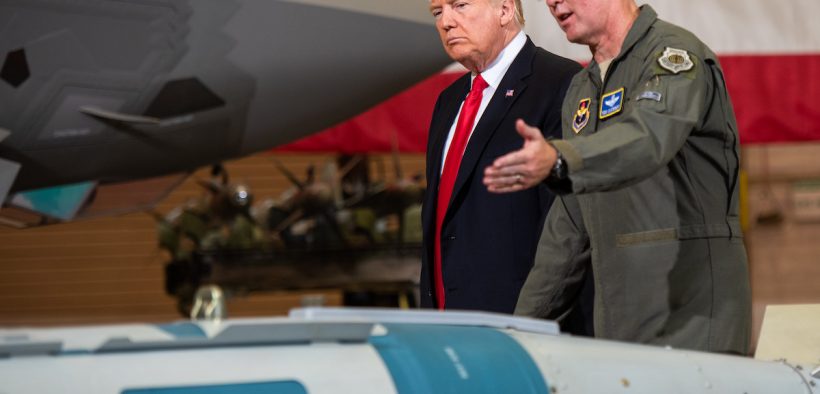Trump’s NASA Wants Space Force to Defend Space Commerce

“The commerce is there. The defense of that commerce is not.”
As the 21st-century space race builds momentum, questions regarding the legal framework regulating economic development in outer space hold enormous consequences. The most advanced nations and corporations could reap massive private profits in what analysts estimate will be a multi-trillion dollar industry within decades, a vision Trump’s NASA hopes to capitalize on.
Space Force: To Protect and Serve Space Commerce
An internal draft of NASA’s “National Exploration Campaign Report” from August 2018 argues for the need of U.S. military to protect private commerce in outer space.
The document, obtained by a FOIA request from MuckRock, also expressed NASA’s desire to prove US-style neoliberal capitalism superior to the state-driven economic model of China: “Faced with state-backed competition, the innovation and efficiency of … U.S. companies will be tested. As we work to help enable their success, they will strengthen the power of free market capitalism over other forms of economic organization.”
As Muckrock’s Matthew Gauriglia notes, the document doesn’t explain how American citizens could benefit from outer space economic development, but only the need for providing military protection to private space corporations. The documents show NASA administrator Jim Bridenstine explaining, “The commerce is there. The defense of that commerce is not.”
Last week, Sen. Ted Cruz was mocked after he claimed developing Trump’s Space Force was necessary to protect from ‘space pirates’. “May space pirates devour your liver,” the senator tweeted to MSNBC’s Chris Hayes, after the All In host called Cruz’ Space Force defense the “saddest tweet I’ve ever seen.”
The FOIA-uncovered documents are not the first example of the Trump administration’s interest in space commercialization. Documents obtained by Politico in February 2017 showed an internal plan to conduct what “may be the biggest and most public privatization effort America has ever conducted,” according to Trump administration officials. The early proposed strategy made a clear distinction between “Old Space,” referring to NASA’s traditional contractors like Boeing and Lockheed Martin, versus “New Space,” consisting of SpaceX and Blue Origin.
Representative Newt Gingrich explained the administration’s rationale to Politico:
“A good part of the Trump administration would like a lot more aggressive, risk-taking, competitive entrepreneurial approach to space. A smaller but still powerful faction represents Boeing and the expensive old contractors who have soaked up money with minimum results. No NASA program dominated by bureaucrats could take the risks, accept the failures and create a learning curve comparable to an entrepreneurial approach.”
Buzz Aldrin, the second person to walk on the moon, said the U.S. should “attract other nations with compelling inclinations,” to gain the edge on China, its main competitor. His son Andy also believes market economics could invigorate human space exploration:
“We can leverage more investment in commercial markets to provide a better foundation for what NASA would like to do with human exploration. We have to understand what the relationship between those two things can be. Sound market economics can be a real strong foundation to launching a mission to Mars and human habitation to Mars.”
Criticism of Space Commercialization and Space Force
Detractors of outer-space privatization criticize the emphasis on concentrated wealth accumulation. The socialist magazine Jacobin scorns the extrapolation of neoliberal capitalism to space, calling it “trickle down astronomics,” and arguing, “we could fight for a galactic democracy, where the proceeds of the space economy are distributed widely.” Jacobin’s Nick Levine argues the already-extreme inequality on Earth would be amplified by laissez-faire space development, and challenges the humanitarian ambitions of space travelers who use fossil fuel dependent rockets at a time of climate crisis.
There is already legal precedent for Jacobin’s egalitarian vision, as the Outer Space Treaty of 1967, signed by over 90 countries, rejects the legal right of nations to claim sovereignty of celestial bodies through occupation.
“The exploration and use of outer space shall be carried out for the benefit and in the interests of all countries, irrespective of their degree of economic or scientific development, and shall be the province of all mankind,” the treaty declares. With boundless resources available in the final frontier, it remains to be seen if humankind will choose to develop the cosmos with cooperation or competition.















